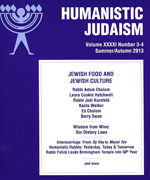Humanistic Judaism, Spring 1983, Volume 9, No. 1
Saying something positive about anti-Semitism hardly seems rational. In the century of the Holocaust, such a statement seems an insult to the innocent martyrs to Nazi evil.
What could possibly be positive about the hateful force that has killed millions of Jews, humiliated thousands of others and filled our lives with fear and anxiety?
We all know that many Jews are masochists and that they thrive on suffering and persecution. The thought of happiness and pleasure fills them with dread. But do we want to praise masochism? Are there no more creative ways of serving their needs than finding them anti-Semites?
We all know that many Jews fear that Jewish identity in the Diaspora will fade away in a friendly environment and that anti-Semitism is necessary to motivate most Jews to remain Jews. (Look at the Jewish awakening in the Soviet Union.) but why turn the society into a virtue? How valuable is an identity that only persecution can sustain?
We all know that the state of Israel was made possible by the Holocaust. Without Nazi hostility, the Zionists would never have motivated a sufficient number of Jews to choose Palestine. Nor would the desire for a Jewish state have become so intense among the Jewish masses. Nor would American Jews, motivated by guilt and anger, have pressured their own government so relentlessly. But is any Jewish state worth the price of six million dead? Would we not forego the state of Israel if they could be restored to life?
So, of course, we start out our analysis by clearly stating that if we had our “druthers”, we would choose a Jewish history without anti-Semitism. But since we are not in control of the social forces that determine human events and since anti-Semitism has, indeed, been an integral part of the Jewish experience, we can seriously ask — have there been any useful consequences of this terrible assault?
For Jewish humanists who value their Jewish identity, the truth of the matter is that the parts of the Jewish personalities that are humanistically most interesting were produced by anti-Semitism.
Let me explain.
The Jew of ancient times was a pious peasant. He was a more likely candidate for the moral majority in the A.C.L.U. Attached to his family, clan, tribe and ancestors, he revered them all. Like most village people, he believed in the rightness of his own ways and was hostile to aliens.
In the Christian world, Jews became bourgeois pariahs, tolerated because they were economically necessary. Once their economic usefulness was threatened by competitors, they became “devils,” conspirators of evil who are worthy of death and destruction.
After the Enlightenment secularized a good part of the Christian world, the Jewish “devil“ became a secular “devil.” Instead of the old accusations of ritual murder in the stabbing of wafer hosts, the image of the world conspirator emerged. No longer viewed is only a religious enemy, the Jew became the racial foe, the atheistic planner of both materialistic capitalism and immoral communism. Since he invented both sides of a quarrel, he kept the Gentile world in social turmoil.
The danger of secular anti-Semitism was its exportability. A Christian setting was no longer necessary. Even Arabs (who were Semites) could enjoy it.
“The parts of the Jewish personality that are humanistically most interesting were produced by anti-Semitism.”
The Christian personality was not altered by anti-Semitism. Hostility to Jews flowed quite naturally from its dogma, its intensity, and its fanatic piety. Since the Christian world experienced power and success and kept Jews in a lowly position, fact and faith coincided. Experience and propaganda did not seem too far apart. The world had the semblance of order and justice.
But anti-Semitism had the opposite effect on the Jewish personality. Anti-Semitism separated fact from faith, experience from propaganda. The suffering of the Jews hardly seemed consistent with divine justice and love, especially for the favorites of God. Rabbinic Judaism might promise happiness in the future. But the rabbis found it difficult to explain the fury of the present.
Some Jews responded to the onslaught with guilt. They assumed that their suffering was due to their bad behavior and not to God’s injustice. They became even more pious, even more faithful. Some Jews discovered that resignation and appeasement were comfortable postures. They felt safer as pitiable creatures than as powerful ones.
But many Jews responded with anger. Since the religious establishment would never allow such an unworthy feeling to be openly expressed to God, it was redirected. Hostility to Gentiles was a safe alternative, so long as it was verbalized within the group.
Ultimately, the anger manifested itself in three behaviors and attitudes which became an important part of the Jewish personality in modern times, especially the European Ashkenazic one. These responses were attempts to preserve Jewish dignity, sins anger, as a positive emotion, is an expression of defiance, a defense of one’s own space against intruders.

